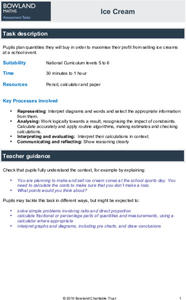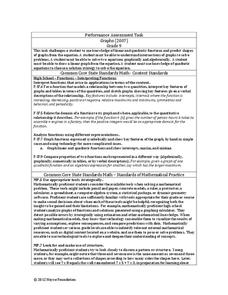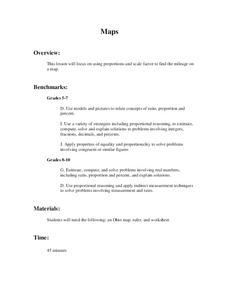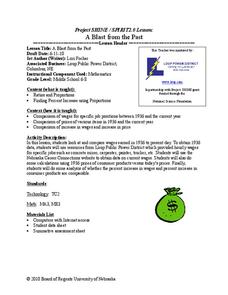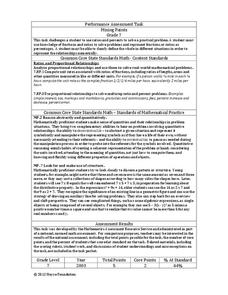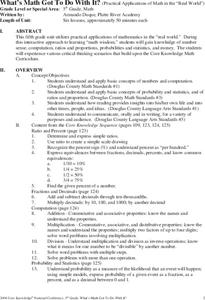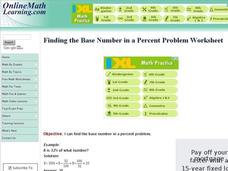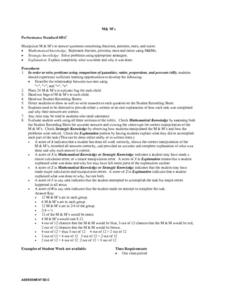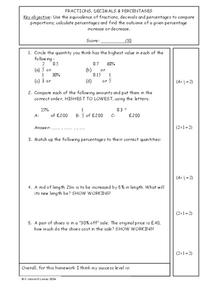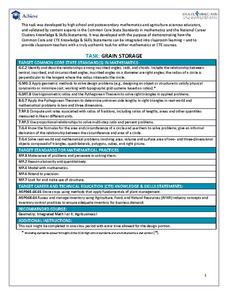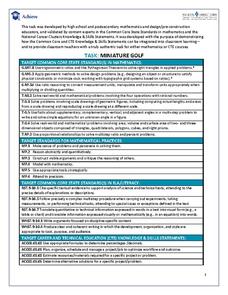Bowland
Ice Cream
Make sure there is enough ice cream on hand. Learners try to find out how much ice cream to buy for a sports event. Scholars use a pie chart showing the percent of a sample of people who like different flavors of ice cream. Using the...
Inside Mathematics
Graphs (2007)
Challenge the class to utilize their knowledge of linear and quadratic functions to determine the intersection of the parent quadratic graph and linear proportional graphs. Using the pattern for the solutions, individuals develop a...
PBS
The Lowdown — Exploring Changing Obesity Rates through Ratios and Graphs
Math and medicine go hand-in-hand. After viewing several infographics on historical adult obesity rates, pupils consider how they have changed over time. They then use percentages to create a new graph and write a list of questions the...
Curated OER
All About Ratios
Students investigate the use of multiplication and division of whole numbers to solve problems including equivalent ratios and rates.
Curated OER
Normal Curve Areas
In this normal curve areas worksheet, students follow 6 steps to compute the probability regarding the possible sample of proportions using a large sample population. First, they label the Ps-scale with the proportion and corresponding...
Curated OER
Maps
Young scholars figure out the mileage from one state to another using a map. In this map lesson, students look at the scale factor and turn it into a fraction. They measure the distance between two cities and use the proportion to find...
Curated OER
A Blast From The Past
Students investigate ratio and proportion as they solve problems. In this algebra instructional activity, students calculate the percent increase on salaries and convert between decimals and percents to calculate. They rate job positions...
Curated OER
Working with Percentages
Students complete basic operations using percentages in a variety of real world situations. Discounts are computed and compared to a variety of prices listed in local newspaper advertisements.
Math Worksheets Land
Find Percentages of Numbers - Step-by-Step Lesson
Finding a percentage of a number is a skill learners must know in order to be successful thinkers. The resource introduces this concept with a guided explanation and can be used with the additional materials as a complete lesson.
Noyce Foundation
Cereal
Find the best protein-packed cereal. The short assessment task covers equivalent and comparing ratios within a context. Pupils determine the cereal with the highest ratio of protein. A rubric helps teachers with point allotments for...
Noyce Foundation
Mixing Paints
Let's paint the town equal parts yellow and violet, or simply brown. Pupils calculate the amount of blue and red paint needed to make six quarts of brown paint. Individuals then explain how they determined the percentage of the brown...
Curated OER
What's Math Got To Do With It?
Students explore numbers, computation, ratios, proportions, probabilities, statistics, and money in this six lessons unit. Practical applications in the real world are emphasized through an interactive approach to math in these lessons.
Curated OER
Daily Time Ratios
Students track and record how much time they spend on each activity. In this spreadsheet lesson, students apply different functions using Microsoft excel to format cells and calculate the sum of their total time spent each day. They...
Curated OER
A Number is X% of What Number?
For this algebra worksheet, students solve for the base of a number given the percent and its partial amount. There are 10 questions.
Curated OER
Not Everything is More Expensive
Students explore percent increases and decreases. They calculate the percent increase and decrease. Students use math to solve problems and communicate. They apply the given formula for percent increase/decrease.
Curated OER
M&M's
Pupils use M&M candies to show fractions, percents, and ratios. Individually, they complete a worksheet using their candies and solving equations of greater than or less than. They review their answers and strategies used as a class.
Curated OER
Finding Total Given Part and Percentage
Students observe models of fractional parts. After writing the definitions of percent, part and whole, students use the calculators and computers to solve problems. Individually, they complete assigned problems where the convert the...
Curated OER
Ratio Relationships
Students solve for the different ratio and proportion of a problem. In this geometry lesson plan, students show their knowledge of how to solve proportional relationships. They convert between percent, decimals and fractions.
Curated OER
Fractions, Decimals and Percentages
In this fractions, decimals, and percentages worksheet, students compare and order given amounts. Students identify equivalent numbers. They calculate the percent of a given number and convert from a fraction to a percent and to a...
Curated OER
Ratios
Sixth graders investigate the concept of ratios and how they can be used to represent the comparison of quantities. The activity is taught using a table or graph to compare two categories of data.
Curated OER
Task: Grain Storage
Farming is full of mathematics, and it provides numerous real-world examples for young mathematicians to study. Here, we look at a cylinder-shaped storage silo that has one flat side. Given certain dimensions, students need to determine...
Curated OER
Task: Miniature Golf
"Fore!" All right, no one really yells this out in miniature golf, but this well-defined activity will have your charges using lots of numbers in their unique design of a miniature golf hole. Included in the activity criteria is the...
Curated OER
Task: Range of Motion
If you have ever injured your shoulder, you know it takes a while to improve your arm's range of motion. In this real-world example, young mathematicians gain insight into the world of physical therapy while they analyze a case study...
Curated OER
One Size Fits All, Part 1
Can you tell how tall someone is just by looking at their feet? In this activity, young mathematicians measure their height, arm span, and foot size, graph their findings, and answer questions about how these measurements are related....


